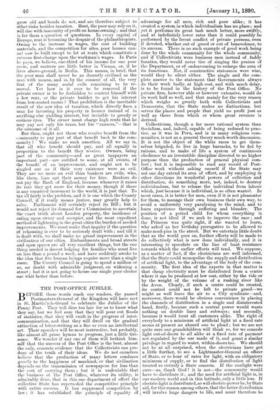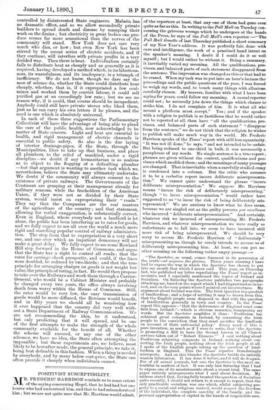THE POST-OFFICE JUBILEE.
-MO EFORE these words reach our readers, the passed Postmasters-General of the Kingdom will have met in St. Martin's-le-Grand to celebrate the Jubilee of the Penny Post. They will dine too late for us to know what they say, but we feel sure that they will pour out floods of statistics, that they will exult in the progress of inter- communication, and that they will dwell on the gradual extinction of letter-writing as a fine or even an intellectual art. Their speeches will be most instructive, but probably, like .almost all prose hymns to progress, just a little tire- some. We wonder if any one of them will bethink him- self that the success of the Post Office is the best, almost the only, concrete evidence that the Collectivists can pro- duce of the truth of their ideas. We do not ourselves believe that the production of many letters conduces greatly to the happiness of mankind, or that civilisation .depends on the transmission of newspapers for less than the cost of carrying them ; but it is undeniable that the business of the Post Office, whatever its utility, is admirably done, that in this one department of effort the collective State has superseded the competitive principle with entire success. It has suppressed competition by law ; it has established the principle of equality of advantage for all men, rich and poor alike ; it has created a system in which individualism has no place ; and yet it performs its great task much better, more swiftly, and at indefinitely lower rates than it could possibly be performed by the freest conflict of private persons, even if devoted, whether out of greed or out of benevolence, to its success. There is no such example of good work being done by the whole community for the whole community, and if Collectivists were business men instead of faddy fanatics, they would never tire of singing the praises of the Department, or of endeavouring to enlarge the area of its functions. Nor, if constructive statesmen were wise, would they be silent either. The single and the com- plete answer to the statement that Governments always do their work badly, at high cost, and with much delay, is to be found in the history of the Post Office. No private firm, however able or however extensive, would do its work half so well, and that mainly for the very reason which weighs so greatly both with Collectivists and Democrats, that the State makes no distinctions, but serves the places and people that yield no profit just as well as those from which or whom great revenue is derived.
Collectivism, though a far more rational system than Socialism, and, indeed, capable of being reduced to prac- tice, as it was in Peru, and is in many religious com- munities, is not as a general theory much worth discussion. It is not the object of the white races to get them- selves brigaded, to live in huge barracks, to be fed by rations, and to make of life a system of continuous obedience to an irresistible discipline directed to no higher purpose than the production of general physical com- fort ; but it is impossible to read any record of Post- Office work without asking oneself if the State may not one day extend its area of effort, and by employing in other directions its wonderful powers of collection and distribution, do something more, not, indeed, to destroy individualism, but to release the individual from labour which, just because it is individual, is so often wasted. In most cases, it is better for men, even if it is not pleasanter for them, to manage their own business their own way, to avoid a uniformity very paralysing to the mind, and to learn experience through suffering and blunder. The position of a petted child for whom everything is done, is not ideal if we seek to improve the .race ; and the Princess was quite right, if she wanted to learn, who asked as her birthday prerogative to be allowed to make mud-pies in the street. But we entertain little doubt that as the world goes on, further efforts will be made to do collectively what is now done individually, and it is interesting to speculate on the line of least resistance towards which the earlier efforts will tend. We suppose, as a matter of fact, if the electricians are well informed, that the State could monopolise the supply and distribution of artificial light, to the advantage of the body of the com- munity. The first idea of the experts in that matter is that cheap electricity must be distributed from a centre where it can be produced at low cost, either by the tide or by the weight of the volume of a rushing river like the Avon. Clearly, if such a centre could be created, its control could not be left to private greed—we might as well leave the air to a City syndicate—and, moreover, there would be obvious convenience in placing the channels of distribution in a single and disinterested hand, firstly, because such a central power would waste nothing on double lines and subways ; and secondly, because it would treat all customers alike. The right of everybody to a minimum of artificial light at a fixed rate seems at present an absurd one to plead ; but we are not quite sure our grandchildren will think so, for we concede light out-of-doors to all alike at a fixed rate of payment not regulated by the use made of it, and grant a similar privilege in regard to water, within-doors too. We should not be at all -surprised, when the electricians have got a little further, to see a Lightmaster-General an officer of State, or to hear of rates for light, with an obligatory minimum of supply, or to find the distribution of light treated as entirely a State concern. If the •sunlight were ours—as, thank God ! it is not—the community would have to distribute it ; and the need for artificial light is, in our modern world and in this latitude, only a little less. If electric-light is distributed, so will electric-power be, by State aid, for this reason among others, that the latter distribution will involve huge dangers to life, and must therefore be controlled by disinterested State engineers. Malaria has no dramatic effect, and so wa allow scoundrelly private builders to spread death and disease by sca,mping their work on the drains ; but electricity in great bodies can pro- duce scenes far more sensational than the nerves of the community will stand. New York does not care very much who dies, or how ; but even New York has been stirred' by the recent series of electric accidents, and if they continue; will interfere with private profits in a very decided way. Then there is heat. Individualism certainly fails to distribute heat as cheaply and as generally as it is required, having, developed a method which, in its laborious- ness, its wastefulness, and its inadequacy, is a triumph of inefficiency. We do not know, though we dare say the men of science do, whether the State could distribute heat cheaply, whether, that is, if it expropriated a few coal- mines and worked them by convict labour, it could sell purified gas at an exceedingly low rate ; but we see no reason why, if it could, that course should be inexpedient. Anybody could still have private stoves who liked them, just as he can carry his own letters if he pleases, and the need is one which is absolutely universal.
In each of these three suggestions the Parliamentary Collectivist will have the advantage of being able to plead the care of the public health, now acknowledged to be matter of State concern. Light and heat are essential to health, and rigid management of electric channels is essential to public safety. So also is the due laying of interior drainage-pipes, if the State, through the Municipalities, likes to take up that business, and place all plumbers, to the relief of mankind, under a rigid discipline—we doubt if any humanitarian is so zealous as to object to the flogging of a defaulting plumber —but that argument is wanting to another task which we, nevertheless, believe the State may ultimately undertake. We doubt if the community will always consent to the existence of private railways. The Governments of the Continent are grasping at their management already for military reasons, while the freeholders of the American Union, if they were not so divided by their State system, would insist on expropriating their " roads." They say that the Companies are the real masters of the agriculture of the country ; and that statement, allowing for verbal exaggeration, is substantially correct. Even in England, where everybody not a landlord is let alone, the public has been interfering as to rates for goods, and we fully expect to see all over the world a much more rigid and searching popular control of railway administra- tion. The step from that to expropriation is a very short one, and one over which an impatient democracy will not make a great delay. We fully expect to see some Rowland Hill step forward in the House of Commons, and argue that the State has a right to control all roads ; that the rates for carriage check prosperity, and could, if the lines were doubled, be reduced by two-thirds ; and that the true principle for arranging charges on goods is not weight but value, the principle of rating, in fact. He would then propose to take over the Railways and work them through a Carrier- General, who would be a Cabinet Minister and probably be changed every two years, the office always involving death from worry within the House of Commons. Still, the rates would be very low, the easy transmission of goods would be more diffused, the Revenue would benefit, and in fifty years we should all be wondering how it ever happened that the country did very well with- out a State Department of Railway Communication. We are not recommending the idea, be it understood, but only predicting that it will spread, and be one of the first attempts to make the strength of the whole community available for the benefit of all. Whether the scheme will succeed, or any one of the other schemes, we have no idea, the State often attempting the impossible ; but these experiments are, we believe, most likely to be hereafter made, the general principle, we take it, being best definable in this fashion. When a thing is needed by everybody, and by many below cost-price, the State can often provide it cheaply when individuals cannot.







































 Previous page
Previous page